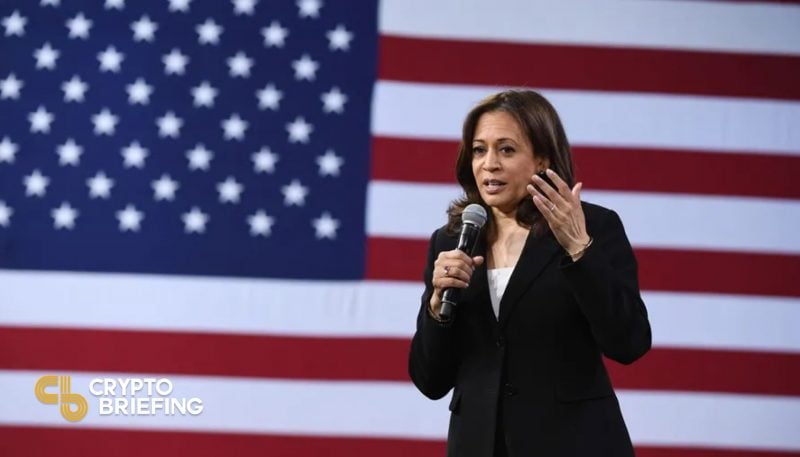
Author: Edmund on wallpapers.com
Kamala Harris eyes support for crypto industry growth with consumer safeguards
The Harris campaign looks to balance industry expansion with regulatory oversight, although the minute details of its stance on crypto remains unclear.
Vice President Kamala Harris plans that would help and support policies fostering growth in the crypto and digital asset industry while maintaining consumer protections, a report from Bloomberg indicates, citing a senior campaign adviser. The stance aims to court an emergent crypto sector that is flexing increasing political influence.
Brian Nelson, senior policy adviser to Harris’ campaign, outlined the vice president’s approach during a roundtable at the Democratic National Convention.
“She’s going to support policies that ensure that emerging technologies and that sort of industry can continue to grow,” Nelson stated, responding to questions on Harris’ efforts to engage the crypto community.
The comments highlight the campaign’s attempts to strike a balance between embracing innovation and implementing appropriate safeguards for an industry that has experienced high-profile company collapses leading to massive liquidations and bankruptcies. Earlier in March, Sam Bankman-Fried, the founder and former CEO of FTX, was sentenced to 25 years in prison for his involvement in one of the biggest financial fraud cases in American history.
Nelson emphasized the need for “stable rules, rules of the road” that the sector has expressed as crucial for its development.
Cutting bureacracy and regulatory red tape
Harris herself alluded to this balanced approach in a recent campaign speech in North Carolina, albeit without explicitly mentioning digital assets or crypto. The vice president pledged to “focus on cutting needless bureaucracy and unnecessary regulatory red tape” while encouraging “innovative technologies [while] protecting consumers and creating a stable business environment with consistent and transparent rules of the road.”
The crypto industry has chafed under what it perceives as burdensome regulations from the Biden administration. In response, the sector is seeking to expand its political influence, including through substantial campaign donations. This shift comes as former President Donald Trump, Harris’ opponent in the upcoming election, courts crypto enthusiasts with promises of a more crypto-friendly regulatory environment.
Trump has vowed to fire SEC Chair Gary Gensler, whose term extends until 2026, and appoint regulators sympathetic to the crypto industry. He has also proposed creating a crypto industry presidential advisory council and developing a stablecoin framework to support US dollar dominance while blocking out prospects of a US-based CBDC. Such an approach has garnered support from prominent crypto figures like billionaire investors Cameron and Tyler Winklevoss.
Trump could exacerbate inflation, Harris remains unclear
Rohini Kosoglu, Harris’ former domestic policy adviser, contrasted the vice president’s economic approach with Trump’s, suggesting Harris would provide more certainty to businesses.
“Businesses are concerned about the chaos of a second Trump administration, and what that means for not knowing rules of the road and making sure that they have an opportunity to grow and thrive in an economy,” Kosoglu remarked.
Trump has pledged to renew expiring tax breaks and implement broad tariffs on both US allies and adversaries if re-elected. Critics warn these policies could exacerbate inflation and disrupt global trade, directly impacting crypto markets. Nelson highlighted the uncertainty Trump’s proposed tariffs create for businesses.
“If I’m a business person, I don’t know how to operate my business in that environment,” he said.
Harris faces the challenge of quickly establishing her policy agenda following President Biden’s exit from the race. The economy remains a central issue for voters and a potential liability for Harris. High inflation has fueled discontent with the administration’s economic management, overshadowing efforts to promote infrastructure investments and domestic manufacturing growth.
With less than three months until Election Day, Harris’ team will need to articulate a clear vision for balancing crypto industry growth with consumer protection. Such an approach would need to differentiate her platform from Trump’s while addressing concerns about regulatory overreach expressed by major players in the crypto industry.

 Earn with Nexo
Earn with Nexo